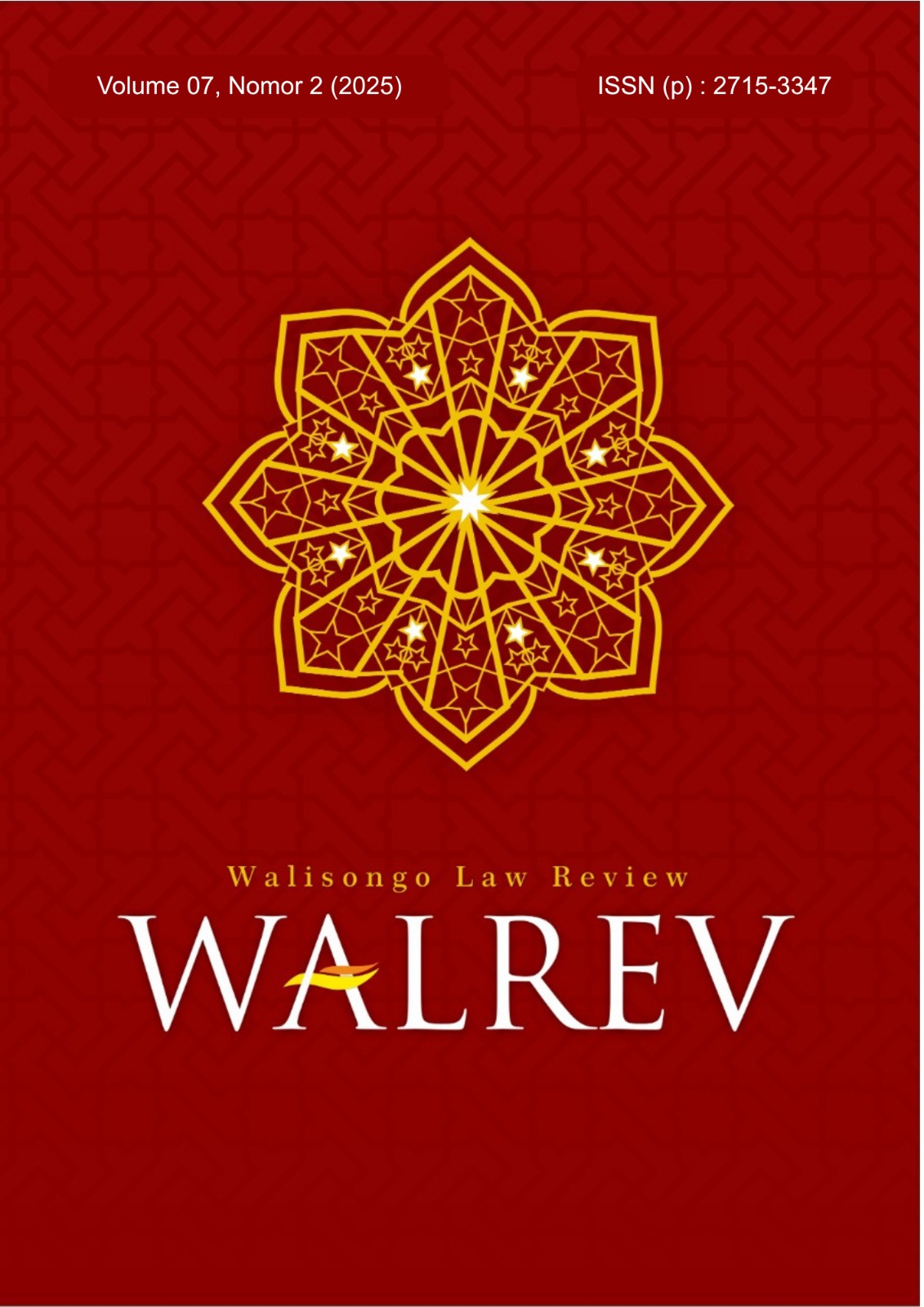Conceptual Criticism of Ombudsprudence in Indonesia and the Development of Good Ombudsnorm for Public Service Provision
DOI:
https://doi.org/10.21580/walrev.2025.7.2.28270Abstract
In practice, Ombudsprudence is a collection of jurisprudence that highlights the success stories of recommendations issued by the Ombudsman. Consequently, the law's desired consistency and unity in handling maladministration cannot be effectively realized. The Ombudsprudence did not encourage the Ombudsman to consider previous recommendations in similar cases. This was a factor in the failure to achieve the ethics, fairness, and propriety recommended by the Ombudsman. This article aims to critique the adoption of Ombudsprudence in Indonesia. In addition, it seeks to purify the concept of Ombudsprudence to make it a tool for realising ombudsnorm and good administrative norms in public services. This article employs a non-doctrinal approach by collecting data through literature studies and interviews. The findings indicate that Ombudsprudence has been misinterpreted as merely a success story in case handling by the Ombudsman, which deviates from the basic idea and original concept in the Netherlands. In fact, the Ombudsman has established non-legal norms; however, misconceptions have led to its neglect as an ombudsman norm. Therefore, it is necessary to purify the concept by examining the indicators proposed by Langbroek and Rijpkema, so that Ombudsprudence aims to establish ombudsnorms in the form of norms of propriety produced by the Ombudsman, directed at creating good administrative norms as standards for exemplary public service in Indonesia.
Ombudsprudensi dalam praktiknya merupakan kumpulan yurisprudensi yang menyoroti kisah sukses rekomendasi yang dikeluarkan oleh Ombudsman. Akibatnya, konsistensi dan kesatuan hukum yang diharapkan dalam menangani maladministrasi tidak dapat terwujud secara efektif. Ombudsprudensi tidak mendorong Ombudsman untuk mempertimbangkan rekomendasi sebelumnya dalam kasus serupa. Hal ini menjadi faktor kegagalan dalam mencapai etika, keadilan, dan kepatutan yang direkomendasikan oleh Ombudsman. Artikel ini bertujuan untuk mengkritisi penerapan Ombudsprudensi di Indonesia. Selain itu, artikel ini juga berupaya untuk memurnikan konsep Ombudsprudensi agar dapat menjadi alat untuk mewujudkan 'ombudsnorm' dan norma administrasi yang baik dalam pelayanan publik. Artikel ini menggunakan pendekatan non-doktrinal dengan mengumpulkan data melalui studi pustaka dan wawancara. Hasil penelitian menunjukkan bahwa Ombudsprudensi telah disalahartikan hanya sebagai kisah sukses dalam penanganan perkara oleh Ombudsman, yang menyimpang dari gagasan dasar dan konsep awal tentang Ombudsprudence di Belanda. Faktanya, Ombudsman telah menetapkan norma-norma non-hukum dan kesalahpahaman tersebut telah menyebabkan Ombudsprudensi diabaikan sebagai norma Ombudsman. Oleh karena itu, perlu dilakukan pemurnian konsep tersebut dengan mengkaji indikator-indikator yang diajukan oleh Langbroek dan Rijpkema, sehingga Ombudsprudensi bertujuan untuk menetapkan norma-norma Ombudsman yang berisi norma-norma kepatutan dan diarahkan untuk menciptakan norma-norma administrasi yang baik sebagai standar pelayanan publik yang patut dicontoh di Indonesia.
Keywords: Ombudsman; Ombudsnorm; Ombudsprudence; Good Administration Norms
Downloads
References
Aditya, Zaka Firma. 2020. “Judicial Consistency dalam Putusan Mahkamah Konstitusi tentang Pengujian Undang-Undang Penodaan Agama.” Jurnal Konstitusi 17 (1): 80–103. https://doi.org/10.31078/jk1714.
Castro, Alberto. 2019. Principles of Good Governance and the Ombudsman. Intersentia Publishing.
Daim, Nuryanto A., Suwarno Abadi, and Taufiqurrahman Taufiqurrahman. 2022. “Urgensi Penerapan Ombudsprudensi dalam Penyelesaian Maladministrasi Pada Kasus Sejenis Yang Terjadi Kemudian.” Wijaya Putra Law Review 1 (1): 61–86. https://doi.org/10.38156/wplr.v1i1.67.
De Nationale Ombudsman. 2017. Rapport No. 2017/078.
Dewi, Ratna Sari. 2019. “Mengenal Ombudsprudensi.” https://www.ombudsman.go.id/artikel/r/artikel--mengenal-ombudsprudensi.
Diamandouros, P. Nikiforos. 2006. The Ombudsman Institution and the Quality of Democracy. Lecture at at the Centre for the Study of Political Change. Siena.
Gandasubrata, H.R. Purwoto S. 1998. Renungan Hukum, untuk Kalangan Sendiri. Ikatan Hakim Indonesia (IKAHI) Cabang Mahkamah Agung RI.
Harahap, M. Yahya. 1997. Beberapa Tinjauan Mengenai Sistem Peradilan dan Penyelesaian Sengketa. Citra Aditya Bakti.
Hartono, Soenaryati. 2002. Peranan Hakim dalam Proses Pembentukan Hukum. Seminar Tentang Peranan Hakim dan Tanggung Jawab Hakim Sebagai Pejabat Negara dalam Sistem Peradilan Indonesia. Jakarta.
Hartono, Sunaryati. 2009. “Metode Penyusunan Ombudsprudensi.” In Ombudsprudensi. Ombudsman.
Hartono, Sunaryati, Enni Rochmaeni, Winarso, and Budhi Masthuri. 2003. Panduan Investigasi untuk Ombudsman Indonesia. Komisi Ombudsman Nasional.
Interview with the Assistant for Recommendation and Monitoring Unit, Ratna Sari Dewi on February 22, 2023.
Interview with the Assistant for Resolution and Monitoring Unit, Asep Cahyana on February 22, 2023.
Interview with the Chairperson of the Indoensian Ombudsman, Mokhammad Najih on February 22, 2023.
Interview with Former Head of the Yogyakarta Ombudsman Representative Office, Budhi Masthuri on February 27, 2023.
Interview with the Vice Chairperson of the Indonesian Ombudsman, Bobby Hamzar Rafinus on February 22, 2023.
Langbroek, Philip, and Peter Rijpkema. 2006. “Demands of Proper Administrative Conduct: A Research Project into the Ombudsprudence of the Dutch National Ombudsman.” Utrecht Law Review 2 (2): 81–98.
Lotulung, Paulus Effendi. 1993. Beberapa Sistem Tentang Kontrol Segi Hukum Terhadap Pemerintah. Citra Aditya Bakti.
Masthuri, Budhi. 2005. Mengenal Ombudsman Indonesia. Pradnya Paramita.
O’Brien, Nick. 2015. “What Future for the Ombudsman?” The Political Quarterly 86 (1): 72–50. https://doi.org/10.1111/1467-923X.12138.
Ombudsman RI. 2009. Ombudsprudensi. Ombudsman.
Ombudsman RI. 2023. Annual Report 2022. Ombudsman. https://ombudsman.go.id/produk/lihat/754/SUB_LT_5a1ea951d55c4_file_20230331_151307.pdf.
Ombudsman RI. 2024a. Annual Report 2023. Ombudsman. https://ombudsman.go.id/produk/lihat/897/SUB_LT_5a1ea951d55c4_file_20240314_134411.pdf.
Ombudsman RI. 2024b. “Ombudsman Recommended Products.” https://ombudsman.go.id/produk/.
Ombudsman RI. 2025. Annual Report 2024. Ombudsman. https://ombudsman.go.id/produk/lihat/995/SUB_LT_5a1ea951d55c4_file_20250521_205256.pdf.
Pompe, Sabastian. 2012. Praktik Yurisprudensi di Negara Civil Law. Seminar dengan Tema Mendorong Konsistensi Putusan: Tantangan Pengadilan Indonesia Masa Kini. Jakarta Selatan.
Remac, Milan. 2013. “Standards of Ombudsman Assessment: A New Normative Concept?” Utrecht Law Review 9 (3): 62–78. https://doi.org/10.18352/ulr.237.
Remac, Milan, and Philip M. Langbroek. 2011. “Ombudsman’s Assessments of Public Administration Conduct: Between Legal and Good Administration Norms.” NISPAcee Journal of Public Administration and Policy 4 (2): 87–115. https://doi.org/10.2478/v10110-011-0005-5.
Riyanto, R. Benny. 2006. “Kebebasan Hakim Dalam Memutus Perkara Perdata di Pengadilan Negeri.” Universitas Diponegoro.
Setiawan, Adam. 2019. “Pelaksanaan Fungsi Rekomendasi Ombudsman Republik Indonesia Terhadap Kepala Daerah dalam Penyelenggaraan Pelayanan Publik (Public Service).” Universitas Islam Indonesia.
Sujata, Antonius. 2002. Ombudsman Indonesia; Masa Lalu, Sekarang, dan Masa Mendatang. Komisi Ombudsman Nasional.
Utrecht, E., and Moh. Saleh Djindang. 1985. Pengantar Hukum Administrasi Indonesia. 9th ed. Ichtiar Baru.
Wiratraman, Herlambang P. 2019. “The Challenges of Teaching Comparative Law and Socio-Legal Studies at Indonesia’s Law Schools.” Asian Journal of Comparative Law 14 (Supplement S1): 229–44. https://doi.org/10.1017/asjcl.2019.15.
Downloads
Published
How to Cite
Issue
Section
License
Copyright (c) 2025 Muliana Mursalim, Rilo Pambudi. s

This work is licensed under a Creative Commons Attribution-ShareAlike 4.0 International License.










